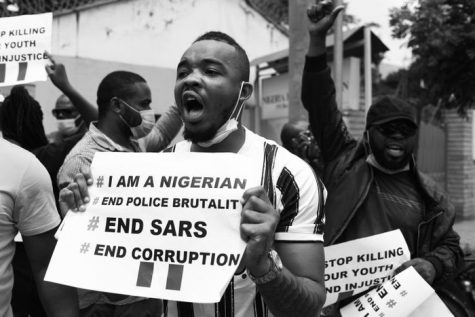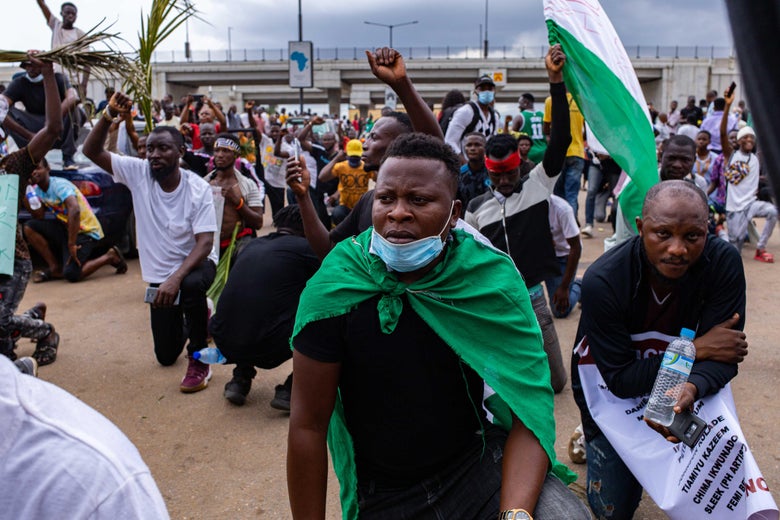Nigerians Continue the #EndSARS Movement
“If you want to help keep your eye on the county.”
Protesters take a knee to honor lives lost to police brutality during a protest against SARS in Lagos. Courtesy of Slate
On Sunday, Nov. 1, a small band of #EndSars protesters assembled at Nnamdi Azikiwe International Airport and the Police Headquarters in Abuja, Nigeria, to revive protests against police brutality, weak governance, and lack of accountability that moved the nation in October.
The Oct. 20 shooting of unarmed, peaceful protestors blocking a highway in Lagos, the country’s largest city and commercial capital, has only added to the fuel of passionate protests demanding an end to the Special Anti-Robbery Squad (SARS) — a federal police unit made to thwart crime.
Soldiers and police attacked demonstrators across several parts of Lagos and elsewhere. So far 51 civilians have been killed in these protests.
Young Nigerians say it’s this constant, decades-long abuse of authority that has tens of thousands of young Nigerians demanding that their government completely disband and #EndSARS.

Courtesy of The Cut (Photo: Simon Maina/AFP via Getty Images)
“The excessive use of force by the police in response to the protests reveals the longstanding disregard for the right to life by Nigerian security forces,” said Amnesty International.
For weeks, these protestors have filled the nation’s streets and social media platforms, such as Twitter and Instagram, to demand justice. Despite possessing enough capital to better lives in Africa’s most populous country, the Nigerian state has neglected their needs, experts say, and in many cases made daily existence worse.
Nigerian President Muhammadu Buhari said he would disband SARS and that would be “only the first step” in extensive police reform.
Protesters are not content with verbal assurances as this is not the first time the Nigerian government has pledged to end SARS and reform the police. Nigerian protestors have criticized the government’s decision to deploy officers from SARS into other police units. They say their demands have now changed from a ban on a selective unit to overall police reform.
“The Nigerian people are willing to protest and risk their lives for the good of the nation and protests historically is usually what prompts change and reform,” said Fatima Sheikh, sophomore.
Although Nigeria just celebrated its sixtieth year of independence, its young people say they are still attempting to attain freedom from the oppressive systems in place.
Sandra Ezekesili, a Nigerian journalist believes that in order to help people from the diaspora should donate as much as possible and educate those around them.
“We have to mention that what is happening in Nigeria is not exclusive to Lagos it is happening all over the country so if you want to help keep your eye on the county,” Ezekesili said. “Traditional media in Nigeria is heavily censored by the Nigerian government so the only saving grace for Nigeria is social media and international media coverage.”
You can learn where to donate to help #EndSARS protestors here.

Aminah Ahmed, a junior is a young dynamic activist and public speaker. She is the host of the talk show NextGen on Apple TV, Roku TV, and Amazon Fire TV....











